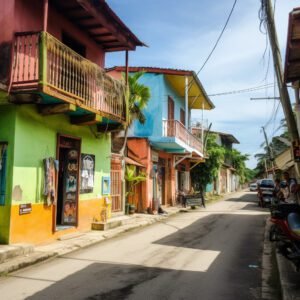Introduction
Traveling to a new country can be an exciting and enriching experience. However, it is important to respect and follow the rules and cultural norms of the country you are visiting. Not only does this show cultural sensitivity, but it also ensures a smoother and more enjoyable trip. In this article, we will explore the key elements of rules and cultural norms in Tonga, helping you navigate your visit to this beautiful island nation in the South Pacific.
Key Elements
Element 1: Respectful Attire
Tonga is a conservative country with strong Christian values. It is important to dress modestly, especially when visiting churches or other religious sites. Both men and women are expected to cover their shoulders and knees, and women may also need to cover their heads. When on the beach or engaging in water activities, swimwear is acceptable, but it should be conservative and not overly revealing.
Element 2: Act with Politeness and Humility
Tongan culture places great emphasis on respect, humility, and hospitality. It is customary to greet others with a smile and a warm “Mālō e lelei” (hello) or “Fakalofa lahi atu” (hello). It is considered impolite to raise your voice or show anger in public. Additionally, it is important to say “fākālofa atu” (please) and “fāmālie” (thank you) when interacting with locals. Respect for elders is highly valued, so be sure to show deference and address them with appropriate titles, such as “sir” or “madam.”
Element 3: Relaxed Pace of Life
Tonga operates on a slower, more relaxed pace compared to many Western countries. This cultural norm, often referred to as “Tonga time,” means that time is less rigidly structured, and punctuality may not be as strictly observed. While it is still important to be respectful of scheduled appointments and tours, it is helpful to adopt a flexible mindset and embrace the laid-back rhythm of the country.
Element 4: Sunday is a Sacred Day
Sunday is considered a sacred day in Tonga, where the majority of the population practices Christianity. It is essential to be mindful of this when planning your activities. Many businesses, including shops and restaurants, may be closed on Sundays. You should refrain from engaging in loud activities, swimming, or wearing revealing clothing on this day, as a sign of respect for local customs.
Element 5: Gift Giving and Etiquette
Gift giving is an important part of Tongan culture. When visiting someone’s home, it is customary to bring a small gift, such as kava (a traditional drink), food, or handicrafts. It is polite to present the gift with both hands as a sign of respect. When receiving a gift, it is polite to accept it with both hands and show gratitude.
Element 6: Environmental Protection
Tonga is renowned for its stunning natural beauty, including coral reefs and diverse marine life. As a responsible traveler, it is important to protect and preserve the environment. Avoid stepping on or touching coral reefs, and refrain from littering or leaving trash behind. Additionally, ask for permission before taking photographs of locals or their property out of respect for their privacy.
Tips for Traveling
- Research local laws: Familiarize yourself with the specific laws and regulations of Tonga before your trip. It is important to respect and abide by these laws to ensure a trouble-free visit.
- Learn basic Tongan phrases: While many Tongans can speak English, learning a few basic phrases in the local language can go a long way in building connections and showing respect for the culture.
- Be mindful of your behavior: Avoid public displays of affection, as Tongan culture views this as inappropriate. It is also important to avoid taking unauthorized photos of people, especially elders or religious ceremonies.
Support the local economy: Purchase locally made products and support small businesses when possible. This helps to contribute to the local community and economy.
Try traditional food and customs: Embrace the Tongan culture by trying traditional dishes, such as lu pulu (corned beef with taro leaves) and ‘ota ika (marinated raw fish). Participate in local customs and events to gain a deeper understanding of the culture.
Disclaimer: This blog post provides general information about the rules and cultural norms in Tonga. While efforts have been made to ensure accuracy, it is always recommended to consult official sources and seek professional advice before your trip. Laws and cultural practices may evolve or vary in different regions of Tonga, so it is essential to stay informed and be respectful of local customs at all times.
By following these rules and cultural norms, you can ensure a respectful and enjoyable experience while visiting Tonga. Embrace the warmth and hospitality of the Tongan people, immerse yourself in the local culture, and create unforgettable memories in this tropical paradise.



